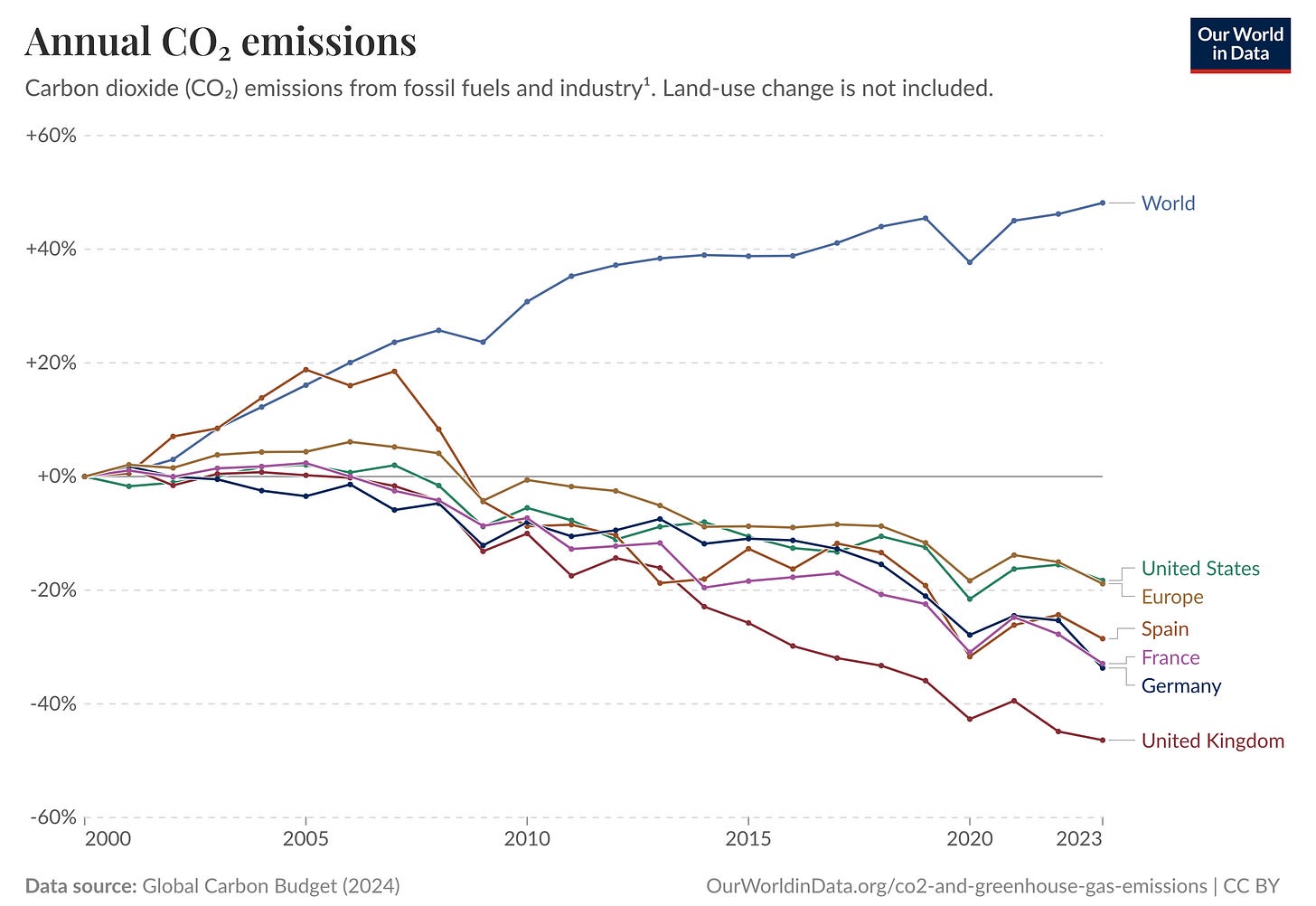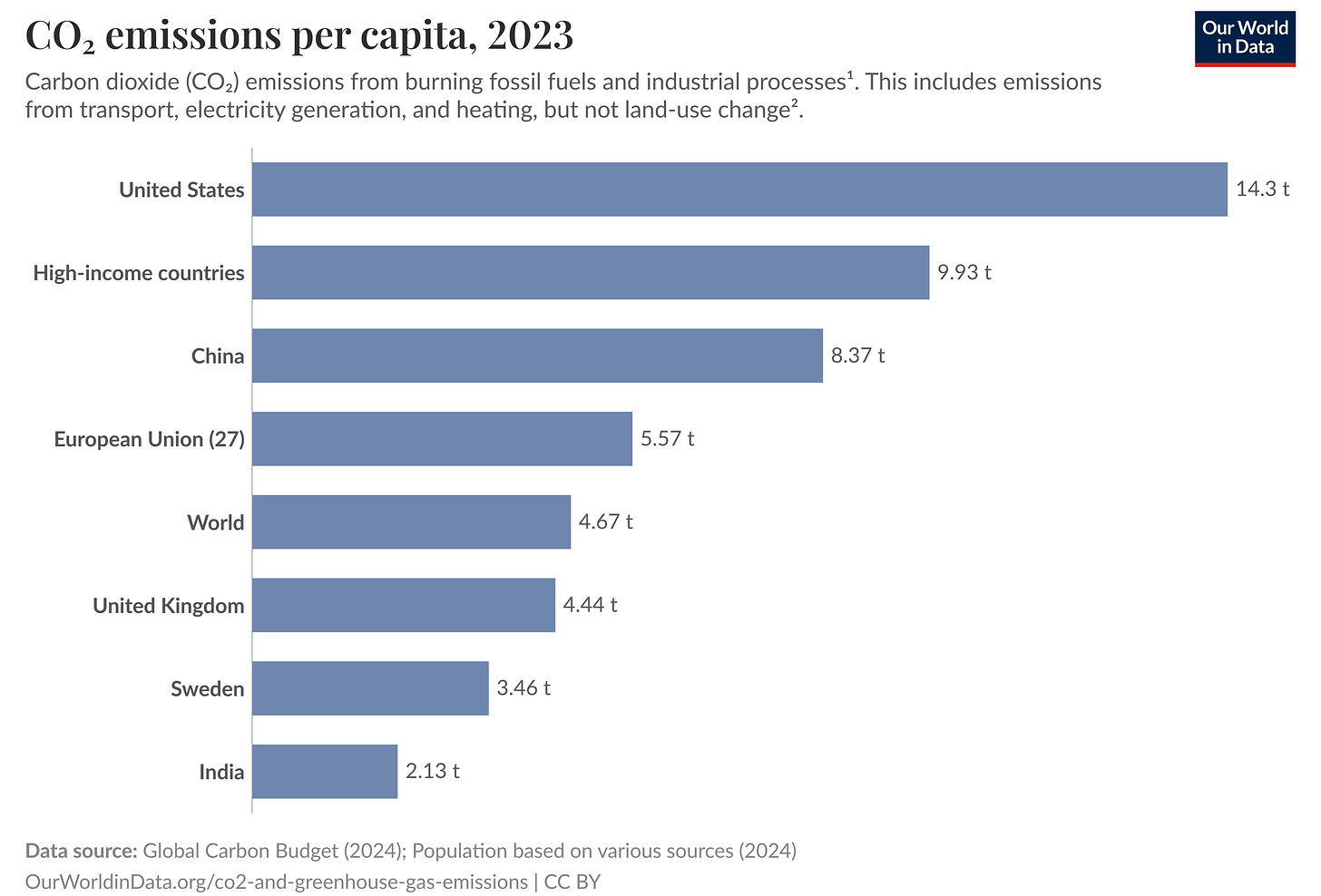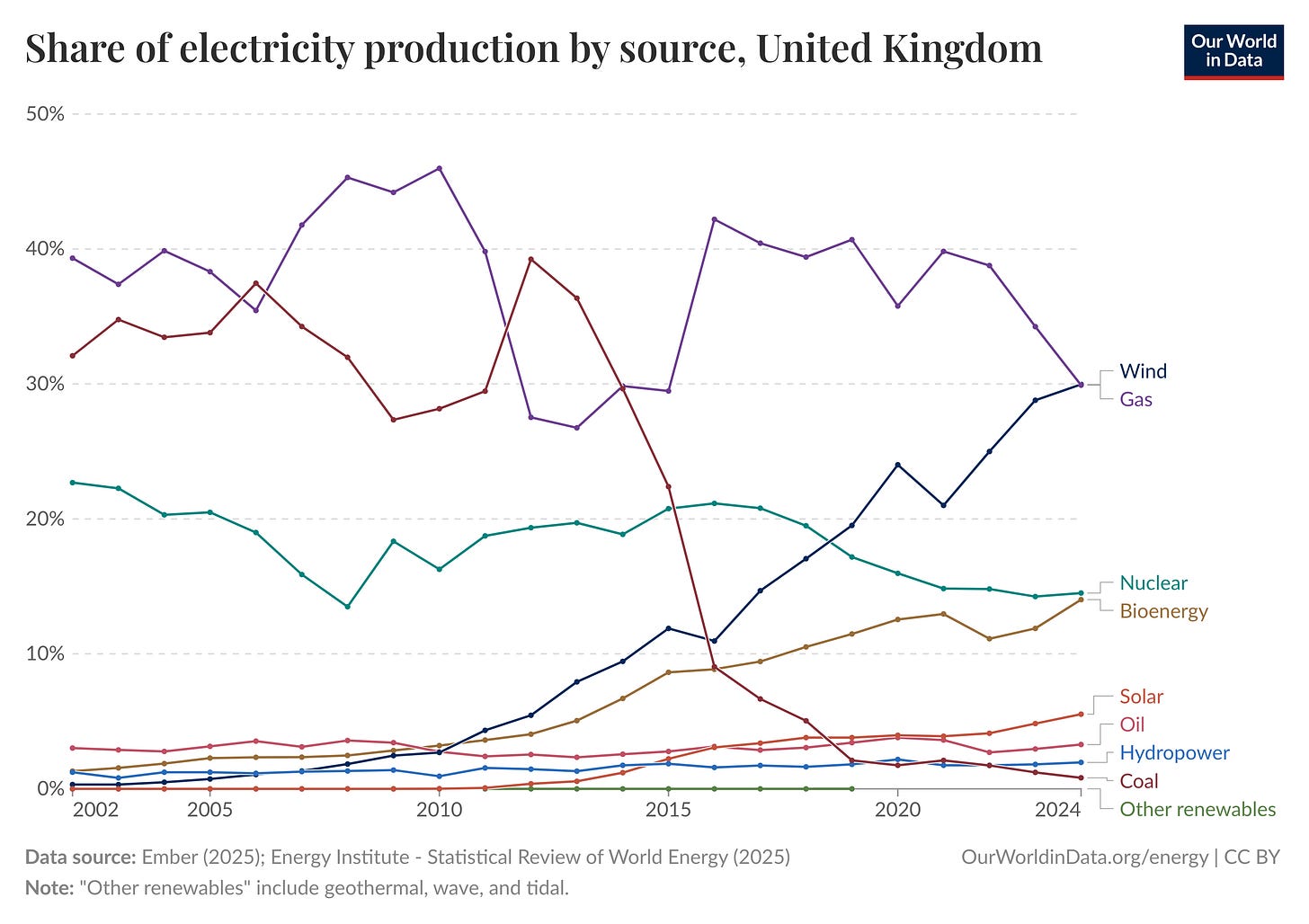The UK Has Made World-Beating Climate Progress
No Large Nation Has Matched Its Emission Reductions
If asked how Britain has contributed to the fight against climate change, one might be tempted to answer with a single word — protests.
Although Sweden birthed Earth’s single most famous climate activist, Britain has spawned the planet’s most aggressive climate movements in the form of Just Stop Oil, Extinction Rebellion, and others who eschew wishy-washy negotiations for the concrete purity of direct action.
In 2022 Just Stop Oil activists infamously threw tomato soup on a Van Gogh painting (the frame was damaged; the painting was not).1 A few weeks later, they blocked the M25 motorway in an incident that led to several prison sentences.2 In 2024, their protesters sprayed orange paint on Stonehenge (the paint was made of cornflour and washed off).3
The disruptive tactics of British activists have captured the world’s attention - and perhaps have had the desired impact of steering climate policy in a more aggressive direction. But not nearly enough attention is given to the UK’s actual record of emissions reductions - which is genuinely very impressive.
Between the year 2000 and the end of 2023, the world’s carbon emissions rose 48%, led by China at 226.2%, India at 210.4%, and Indonesia at 160.6%. The UK’s carbon emissions - by contrast - fell an astounding 46.4% over the same period, outpacing any other G7, G20, or Commonwealth country. Indeed, Britain’s emissions progress has outpaced any country in the world bar Denmark or places whose economies have been destroyed by conflict (Ukraine and Syria).4
And the UK’s carbon emissions are not only low relative to its coal-dusted past. They’re also low on a per-capita basis relative to most other countries. At 4.4 tonnes per person in 2023, the UK’s emissions are less than one third the United States’, around one half of China’s and significantly below the European Union average. The UK is now nearly equal to nuclear-rich France and closing in on Sweden, the ne plus ultra of a large, highly decarbonized developed country.5
Winds of Change
Britain has made this remarkable climate progress by following a simple model: shut down coal-fired power plants and replace them with wind energy (and to a lesser extent fossil gas, solar, and bioenergy).
The UK invented the coal-fired thermal power station, the world’s first opened in London in 1882. Coal powered Britain’s industrialization from the Victorian era onwards and generated 39% of the UK’s electricity as recently as 2012. In 2025, it will generate 0%. The last coal-fired power station in Britain closed last year.
Wind power is now the UK’s largest source of electricity generation at 30% in 2024, edging out fossil gas. Nuclear provides 14.5%. Solar trails at 5.5%, but is growing rapidly.6 Offshore wind in particular is a vast resource that has only begun to be explored, and will greatly expand in future. The UK has enough practical offshore wind potential to meet the nation’s electricity demand seven times over.7
Such a startlingly rapid transition away from coal was accomplished by administrative fiat, with a Conservative government announcing in 2015 it would ban coal-fired power stations from 2025 (later brought forward by a subsequent Conservative government to 2024). The legal authority came from the Climate Change Act of 2008, passed under the previous Labour government.
But ultimate credit for the successful coal phase-out must go to the UK’s unique political consensus around combating climate change. Right-wing British politicians have historically sounded indistinguishable from their left-wing counterparts on the issue.
“Instead of making excuses tomorrow to our children and grandchildren, we should be taking action against climate change today,” Conservative Prime Minister David Cameron told the COP21 climate meeting in Paris in 2015.8
His more populist Conservative successor Boris Johnson concurred in 2021 at COP 26 in Glasgow, “Because humanity has long since run down the clock on climate change. It's one minute to midnight on that doomsday clock, and we need to act now.”9
It’s difficult to imagine Donald Trump delivering either line. In the Anglophone world, only the UK has been blessed with a rational and scientifically literate right-wing capable of interlocking with the left on climate. Such comity is impossible in the United States, and difficult to find even in Australia or Canada.
Untune That String?
Despite record reductions, there is much yet to be done before Britain is fully decarbonized. The remaining fossil gas used for electricity generation must be phased out - a task made easier by the dawn of cheap storage, cheap solar, and existing investments in nuclear. And heating and light transport will need to be fully electrified using heat pumps and EVs.
Solutions must also be found for industrial heat, cement and steel. International standards for decarbonizing aviation and shipping need to be adopted locally. Agriculture and land use must be addressed as well.
None of this is easy. And it could become harder yet as the political harmony around net-zero appears to be fraying. In May, Tony Blair published an op-ed in which he called phasing out fossil fuels “doomed to fail”.10 The former PM initiated Britain’s first measures to fight climate change during his premiership and his volte-face on net-zero was labeled a “bombshell” by lethargic headline writers.
But in truth Tony Blair is very much a discredited and marginalized figure in British politics. The transactional nature of his post-premiership is well-appreciated (oil-drenched Saudi Arabia, Qatar, and the UAE are all paying clients1112) and his musings on climate or any other topic are universally ignored.
Much more worrisome is that both major parties on the political right now have leaders - Kemi Badenoch of the Conservatives and Nigel Farage of Reform - who explicitly oppose net-zero targets. In stark contrast to past Conservative leaders, Badenoch has called Britain’s goal to reach net-zero by 2050 “impossible” without “bankrupting the country”13. Farage - a risible demagogue largely responsible for Brexit - has called net-zero “lunacy” and “complete and utter madness”.
Farage and Badenoch are egged on by knuckle-dragging, Cro-Magnon figures like Matt Ridley - a former hereditary member of the House of Lords turned full-time net-zero critic. Once a serious science writer14, Ridley was science editor of The Economist in the 1980s and authored several well-received science books in the 1990s and early 2000s.
He now spends his days on Twitter waging a vicious meme war against wind turbines and solar panels. Like an elderly DJ spinning long-forgotten 70s hits in a posh SoHo nightclub, Ridley broadcasts recycled, decrepitly outdated narratives about renewable energy to an increasingly befuddled audience.
Intermittent renewables are “unreliable”15, wind farms are “scams”16, wind turbines kill too many birds17, there aren’t enough metals for the energy transition18, solar panels never repay their carbon debt19, agrivoltaics violate the laws of physics20, et cetera. No narrative is too false or too misleading to be articulated or recirculated. And of course no anti-renewable crank is complete without promoting the primary energy fallacy.21
So far, there is little evidence that the anti-net-zero posturing amongst right-wing elites and the associated misinformation onslaught has won over the broader public. Recent polling has shown that 61% of all Britons still back net-zero targets, including half of Conservatives and a third of Reform voters. Support for solar and wind energy polls in the 75%-85% range. Coal and fracked fossil gas - both Ridley favourites - are stuck at 15%-25%.22
Nevertheless, the percentage of Britons who oppose net-zero has crept up to 26%.23 And that number could grow if energy prices continue to climb. Electricity costs in the UK have fallen from their record highs in 2022, but they are still well above their pre-2022 average.
It is not at all clear that wind energy is to blame for Britain’s energy prices. Most honest analyses point to fossil gas and other factors as culprits.24 But unlike in years past there is now a powerful political movement - led by Badenoch, Farage, Ridley and other dubious characters - ready to lie about renewables and cynically exploit economic pain to pursue a pro-fossil fuel agenda.
The UK risks an American-style polarization on climate policy - and consequent emissions backsliding. The Labour government should hasten emissions reductions while also lowering energy prices, thus preserving public support for the energy transition and sustaining Britain’s unrivalled climate progress well into the future.
In 2015 it was revealed a massive coal mine providing 8% of Britain’s coal production sat on inherited lands owned by Ridley. Ridley was estimated to have raked in millions of pounds in land-access payments.
The mine has since closed. Ridley’s bitterness over being on the losing end of the energy transition appears not to have done.
Ibid.






